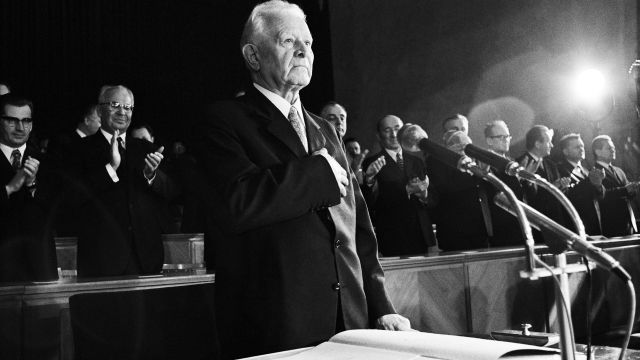You can also listen to the article in audio version.
President Miloš Zeman’s serious health concerns raise questions about how well a head of state can hold office after parliamentary elections. According to some politicians and constitutional lawyers, it is time for both chambers to lose their constitutional functions.
A similar situation with an ailing president has been handled once before – under the communist regime in the 1970s.
In June 1972, the then president of Czechoslovakia Ludvík Svoboda suffered a stroke. This happened during a reception honoring Indian Prime Minister Indira Gandhi, who arrived on a state visit.
The former general from World War II at the time was 76 years old and had four years at Prague Castle. After the collapse at the reception, other health problems were added, and Svoboda, after consulting with her family, decided that she no longer wanted to continue her second term.
However, the top communist parties, led by Secretary General Gustav Husak, initially disagreed. They regard Svoboda as a figure who still has public trust and has helped maintain the smooth running of “normalization”, namely the strengthening of the totalitarian character of the regime, which followed the Czechoslovakian invasion of Czechoslovakia in August 1968.
Svoboda agreed and in March 1973 he was re-elected. However, the second period was marked by protracted problems and gradually worsened from the start. His unhealthy attitude has been seen in the presidential oath taking. Instead of Svoboda, one of the vice presidents of the federal parliament had to read the text of the pledge.
“In late March 1974, he started urinary tract treatment at the State Sanatorium, but after being released for home treatment, he developed a series of pulmonary embolisms, bilateral pneumonia, and pleurisy,” historian Michal Macháček explains in the biography of Svoboda’s successor Gustav Husak.
After receiving heavy sedation, Svoboda even fell into a coma. The doctor said the disease was incurable. A serious phase of negotiations for a new presidential election has begun.
As now in the case of Miloš Zeman, in the spring of 1974, people speculated about what the president really was. There were rumors that Ludvík Svoboda was no longer alive and that the Communist Party leadership was hiding his death so as not to interfere with May Day celebrations.
At that time, the regime reacted by informing the public.
“The Management of the State Sanatorium and the Medical Council declare that, despite intensive care, the health condition of the President of the Republic, Army General Ludvík Svoboda, remains very serious. The permanent medical council continues to monitor all changes in health status and provide the necessary treatment,” the main party daily wrote. Rudé právo on the front page on April 30. The credibility of the information should strengthen the list of attending physicians listed below the text.
During treatment, Freedom is represented by the federal government under the Constitution. The president’s health finally improved so he could be released with home care. However, at the time, it seemed that it was decided within the leadership of the Communist Party not to complete his second term as president.
Information about how Ludvík Svoboda later reacted to his later work at the Castle is not uniform.
According to the written memoirs of his daughter Zoe Klusáková-Svobodová, he wanted to resign, but Communist Party leader Husák refused to abdicate on the grounds that people would not believe his version of a voluntary departure. In contrast, some historians, such as Jiří Pernes, claim that Svoboda did not want to resign as president.
In fact, it was the most powerful man in the country, Gustav Husák, who took the initiative. He gradually confirmed that he would succeed Svoboda and at the same time remain General Secretary of the Central Committee of the Communist Party. The objections of his party’s internal opponents died down when the accumulation of such functions was supported by Soviet Communist leader Leonid Brezhnev.
The decisive step was taken at a meeting of the supreme leadership of the Communist Party in May 1975. The participants were presented with medical reports, according to which Svoboda’s state of health did not allow him to perform his functions properly or fulfill normal conditions during his abdication. Husák, along with Prime Minister Lubomír trougal, later told the others how Svoboda was unable to recognize them during the visit and was unable to carry on a conversation.
However, for Gustáv Husák to take over the presidency smoothly, a Constitution had to be achieved. Amendments to the Constitutional Act of the Czechoslovak Federation, informally nicknamed Lex Svoboda, with the provision that if the president cannot serve more than one year, the Federal Assembly may elect a new president.
It is important that Husák’s close collaborator, Deputy Prime Minister Karol Laco, is responsible for preparing the amendments. Undoubtedly, he was looking for a legally clean solution. However, according to a later evaluation of experts, the problem was that the amendments were retroactive. This, even in conditions of non-liberty, goes against basic constitutional principles.
At the time, however, no one had publicly questioned the adjustment. At the end of May 1975, Husák was elected as the new president.
Ludvík Svoboda, who lived more than four years after taking office as president, was carefully lauded until his death.
Husák, accompanied by the trougal, visited the former president the day after his election. They gave him the Gold Star Hero of Czechoslovakia. The tank division and military college in Vyškov are named after Svoboda.
After his death in September 1979, the Communists arranged for Svoboda to hold a state funeral. Although Gustáv Husák didn’t want it at first, the mourning procession left Prague Castle. According to contemporary reports, more than 300,000 people came to see the parade.

“Certified bacon geek. Evil social media fanatic. Music practitioner. Communicator.”







